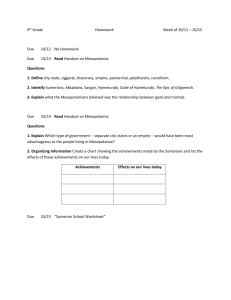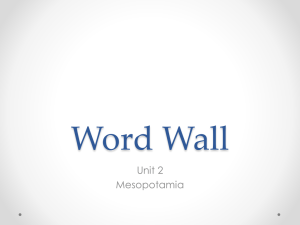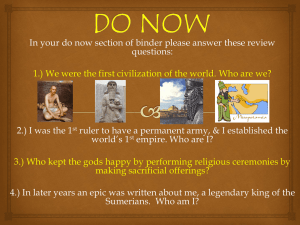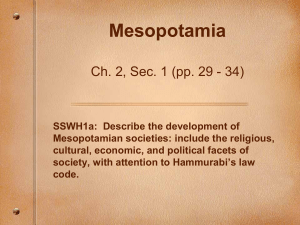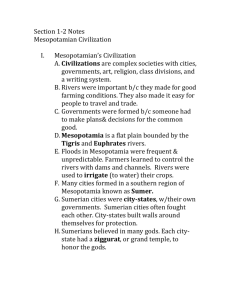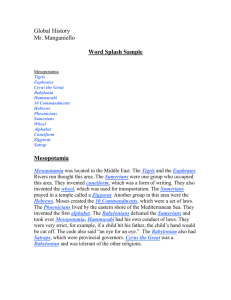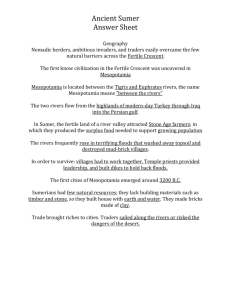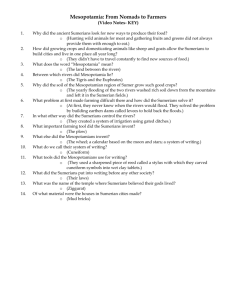Mesopotamia-RDG - Dearborn High School
advertisement
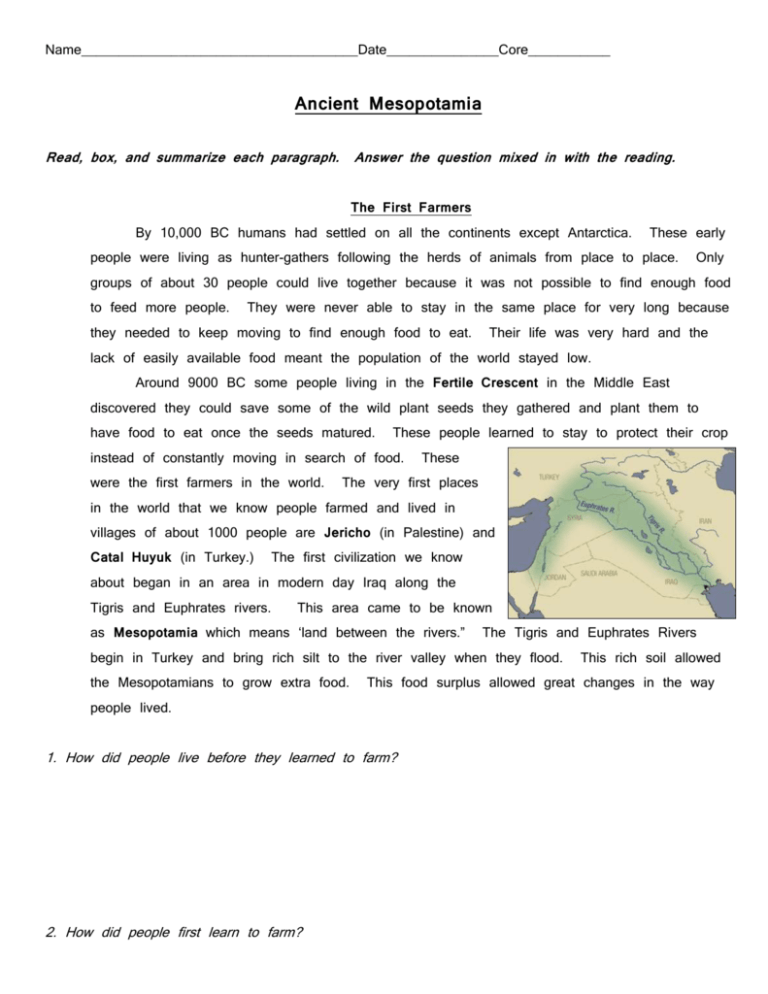
Name_____________________________________Date_______________Core___________ Ancient Mesopotamia Read, box, and summarize each paragraph. Answer the question mixed in with the reading. The First Farmers By 10,000 BC humans had settled on all the continents except Antarctica. These early people were living as hunter-gathers following the herds of animals from place to place. Only groups of about 30 people could live together because it was not possible to find enough food to feed more people. They were never able to stay in the same place for very long because they needed to keep moving to find enough food to eat. Their life was very hard and the lack of easily available food meant the population of the world stayed low. Around 9000 BC some people living in the Fertile Crescent in the Middle East discovered they could save some of the wild plant seeds they gathered and plant them to have food to eat once the seeds matured. These people learned to stay to protect their crop instead of constantly moving in search of food. were the first farmers in the world. These The very first places in the world that we know people farmed and lived in villages of about 1000 people are Jericho (in Palestine) and Catal Huyuk (in Turkey.) The first civilization we know about began in an area in modern day Iraq along the Tigris and Euphrates rivers. This area came to be known as Mesopotamia which means ‘land between the rivers.” The Tigris and Euphrates Rivers begin in Turkey and bring rich silt to the river valley when they flood. the Mesopotamians to grow extra food. people lived. This food surplus allowed great changes in the way 1. How did people live before they learned to farm? 2. How did people first learn to farm? This rich soil allowed 3. Why was the Fertile Crescent a good location for the first farmers? Sumerian Daily Life Many different groups settled in Mesopotamia, but the first group to develop an advanced civilization were called the Sumerians (from an area called Sumer.) farmers grew barley, wheat, lentils and peas. and milk. Early Sumerian They learned to keep goats and sheep for meat By 4500 BC Sumerians invented the plow and used oxen to pull their plows. By 4000 BC the Sumerians had learned to use irrigation. They dug ditches to use water from the rivers to help water their crops. The use advanced methods of farming such as the plow and irrigation along with the fertile soil allowed the Sumerians to grow a surplus of food. surplus allowed the population to grow. This Since more food was available to farms than hunter- gatherers, larger numbers of people could live together. together and farmed the surrounding land. Villages developed where people lived With extra food being grown and more people living together in villages, people began to be able to specialize. The craftsmen who made the tools, warriors, and leaders could live in villages but not have to farm to eat. on the specialized jobs. Specialization lead to social classes that were based Leaders, priests, and warriors became higher social classes. Specialized workers became more skilled because they could focus on one certain job instead of having to do all the jobs. than laborers. Workers that had certain skills came to be a higher social class Sumerian workers made obsidian tools, pottery and wheeled carts. BC Sumerians made the first Bronze tools. 4. What did Sumerians farm? 5. How did Sumerians farm? 6. How did farming lead to the development of villages? 7. How did farming and living in villages lead to specialization? 8. How did social classes develop? 9. What tools did Sumerians use? Over time city-states led by kings developed in Sumer. These city states had certain laws and governed the area around the city. began using silver as money. Sumerians Taxes were paid to By 3500 the government of each city-state to help build public buildings, city walls, etc. a temple called a ziggurat built and run by the government of the city. government workers, warriors, and priests. fields. Each city had Taxes also paid the Slaves were used by city-states to work the farm Early Sumerian cities grew to 10,000 or more people. 10. What is a city-state? 11. How is a city-state different from an empire? 12. What things did Sumerian city-state governments do? 13. What is a ziggurat? 14. What does it tell you that each city had a ziggurat at its center? Sumerian Achievements One major achievement the Sumerians developed was writing. early as 3500 BC have been found. Written records from as The city-state governments needed to keep a record of how much food was grown, who owned what property, and many other things. Early writing was mostly pictures stamped in wet clay that was then allowed to dry and harden. used to represent certain people or items. A seal, like a stamp, was Over time, different language sounds became alphabets with letters to write out words. cut reeds (from plant stems) shaped like a wedge to write. Sumerians used The reed was pushed into clay tablets in a certain pattern. This type of writing is known as cuneiform. Scribes went to special schools to learn how to write. 15. Why did writing develop? 16. How did cuneiform develop? By 3500 BC Sumer was an advanced civilization with cities, governments, specialized jobs, and writing. Art was found in temples and homes. scenes on walls were common. Mesopotamians studies the movement of the sun and stars to help them know when to plant and harvest crops. years ago! Statues of their gods and painted They charted constellations of stars 5000 Ancient Mesopotamian math is still found in some of the numbers we use today. The Mesopotamians used the same numbers we do to describe time. months, their hour had 60 minutes and their day had 24 hours. the number of degrees in a circle. Their year had 12 They used 360 to describe 17. How do Mesopotamian advances in art, science, and math show they were an advanced civilization? Other Ancient Mesopotamians Around 2350 BC Sumer was conquered by a group called the Akkadians. from the city of Akkad conquered Sumer in 2350 BC. Mesopotamia and created the world’s first empire. He went on to conquer all of When the Akkadian Empire fell around 1800 BC two other groups called the Assyrians and the Babylonians took over. These two groups controlled Mesopotamia for the next 1300 years until the Persians conquered in 529 BC. One important Babylonian king was named Hammurabi. Hammurabi set up a government with laws, courts and judges. Hammurabi’s laws were the first set of written laws in the world. Sargon I We call this set of laws Hammurabi’s Code. Hammurabi’s Code lists 282 things people can do wrong and the punishments. Code also lists what justice will be offered to people who are hurt by others. Hammurabi’s Some of the punishments seem cruel to us today and the punishments are different depending on whether the victim was a man, woman, or slave which seems unfair to us today. punishments for people who falsely accuse somebody of a crime. There are even Hammurabi’s code was carved into stones called stele which were put up all over his empire. 18. How did Sargon I effect Mesopotamia? 19. How did Hammurabi improve Mesopotamian life? ________________________________________________________________________________ Use separate paper to do the following. 20. Create Frayer boxes for the following: Fertile Crescent Mesopotamia Sumer cuneiform 21. Create a timeline of the events mentioned in this reading. Hammurabi’s Code 22. Create a tree map describing the parts of Mesopotamian civilization 23. Pick one of the “firsts” mentioned in this reading. written laws, etc.) (bronze tools, the wheel. the plow, farming, Create an advertisement or cartoon describing why this is an important “first.”
